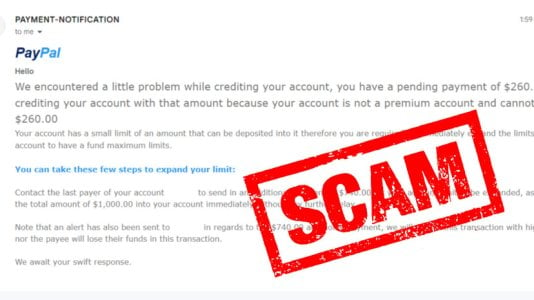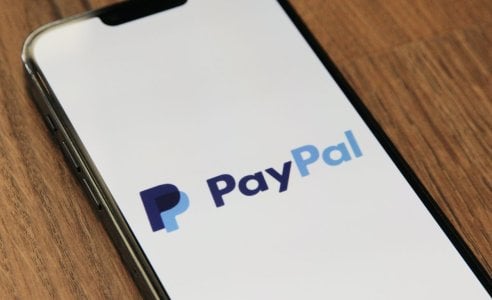Avoid this online selling mistake: How Sarah's dream holiday turned into a $1000 nightmare
Planning a holiday can be tricky, especially when you're on a tight budget. That's why some of us jump at the chance to make extra money by selling unwanted items around the house.
However, Sarah, a 24-year-old, found out the hard way that there are dangers when trying to make a bit of extra money by selling items online.
'I'd saved for a European holiday, and I had this old dress lying around, so I thought I'd try to sell it on Facebook Marketplace to cover some of the costs,' she told a news outlet.
'Things seemed too good to be true when a buyer contacted me quickly, and we agreed on the price fairly easily. In hindsight, this should have been a warning sign–she was just a little bit too keen, and the exchange was almost too easy.'
So Sarah agreed to the sale and allowed the buyer's daughter to collect it. What happened next shook her to the core.
'I got an email from what I thought was PayPal,' she recalls. 'It said the money had been sent to my account–but that the account limit needed to be expanded in order for me to be able to receive it.'
Sarah, thinking that Paypal was a secured platform, didn’t hesitate to follow the prompts in the email and sent an additional $740, as instructed.
Little did she know the email was not from PayPal. She had been scammed–and it cost her $1000. It had all happened in less than a minute.
‘I felt so stupid,’ she expressed. ‘I had always been warned about these things happening, but it all seemed so real! I just didn't think something could happen so fast and to me, you know?’
The Australian Competition and Consumer Commission (ACCC) reports a 47.9 per cent increase in reports of online shopping scams via social media sites like Facebook in 2022 compared to the previous year.
Fortunately, there are some measures you can take to avoid going through the same thing. PayPal will advise you to refrain from following email links and to always log in through their website.
The ACCC also suggests taking a look out for the following when using online sales platforms like Facebook Marketplace:

If something seems too good to be true, it usually is. Remember that the next time you decide to sell an item online, always proceed cautiously.
If you have suspicions or reservations during online transactions, simply put the listing on hold and report it. It's always better to be safe than sorry!
What do you think of this story, dear members? Have you encountered a similar incident? Share your experience in the comments below!
However, Sarah, a 24-year-old, found out the hard way that there are dangers when trying to make a bit of extra money by selling items online.
'I'd saved for a European holiday, and I had this old dress lying around, so I thought I'd try to sell it on Facebook Marketplace to cover some of the costs,' she told a news outlet.
'Things seemed too good to be true when a buyer contacted me quickly, and we agreed on the price fairly easily. In hindsight, this should have been a warning sign–she was just a little bit too keen, and the exchange was almost too easy.'
So Sarah agreed to the sale and allowed the buyer's daughter to collect it. What happened next shook her to the core.
'I got an email from what I thought was PayPal,' she recalls. 'It said the money had been sent to my account–but that the account limit needed to be expanded in order for me to be able to receive it.'
Sarah, thinking that Paypal was a secured platform, didn’t hesitate to follow the prompts in the email and sent an additional $740, as instructed.
Little did she know the email was not from PayPal. She had been scammed–and it cost her $1000. It had all happened in less than a minute.
‘I felt so stupid,’ she expressed. ‘I had always been warned about these things happening, but it all seemed so real! I just didn't think something could happen so fast and to me, you know?’
The Australian Competition and Consumer Commission (ACCC) reports a 47.9 per cent increase in reports of online shopping scams via social media sites like Facebook in 2022 compared to the previous year.
Fortunately, there are some measures you can take to avoid going through the same thing. PayPal will advise you to refrain from following email links and to always log in through their website.
The ACCC also suggests taking a look out for the following when using online sales platforms like Facebook Marketplace:
- Beware of sellers or websites selling at very low prices, sometimes lower than similar items on other websites.
- Watch out if the website or seller is new. Knowing how long the seller has been selling and how many items they have sold so far. Read the comments and reviews on the internet (while also noting that there may be fake positive reviews!).
- Many people report losing money after communicating with a scammer over email. Remember that you must always do transactions through a secure platform.
- Opt for secure payment options if available. Use PayPal or Apple/Google Pay rather than your credit card. Scammers often lure customers into using non-secure methods such as wire, bank or international funds transfers, money orders, pre-loaded gift cards and cryptocurrency.
- Change your passwords immediately if you believe your social media accounts have been compromised. You should also check your recent activities, notify your contacts, and ensure your software is current.
Key Takeaways
- Sarah decided to sell an old dress on Facebook Marketplace but fell for a sophisticated online scam, losing $1000.
- The buyer seemed too keen, and the transaction was too easy. When the transaction was set, Sarah received an email from what she believed to be PayPal, and she unwittingly followed the scammer’s instructions in the email.
- According to the Australian Competition and Consumer Commission (ACCC), there was a 47.9 per cent increase in reported online shopping scams via social media in 2022 compared to the previous year.
- PayPal and the ACCC advise against following email links. Instead, open a browser window, navigate the website, and enter your login info to verify transactions. Be wary when purchasing goods on online platforms to avoid scams.
If something seems too good to be true, it usually is. Remember that the next time you decide to sell an item online, always proceed cautiously.
If you have suspicions or reservations during online transactions, simply put the listing on hold and report it. It's always better to be safe than sorry!
What do you think of this story, dear members? Have you encountered a similar incident? Share your experience in the comments below!










